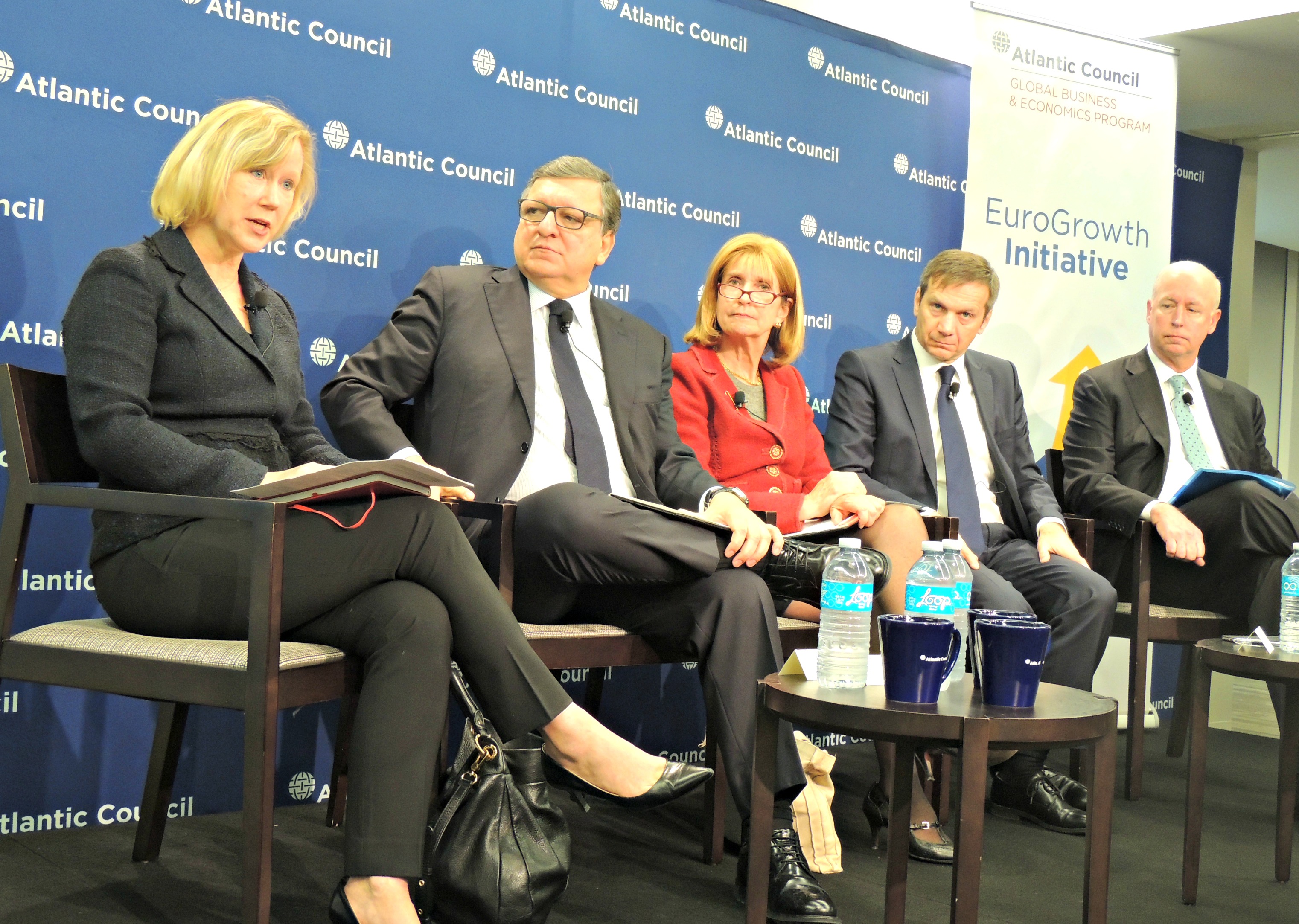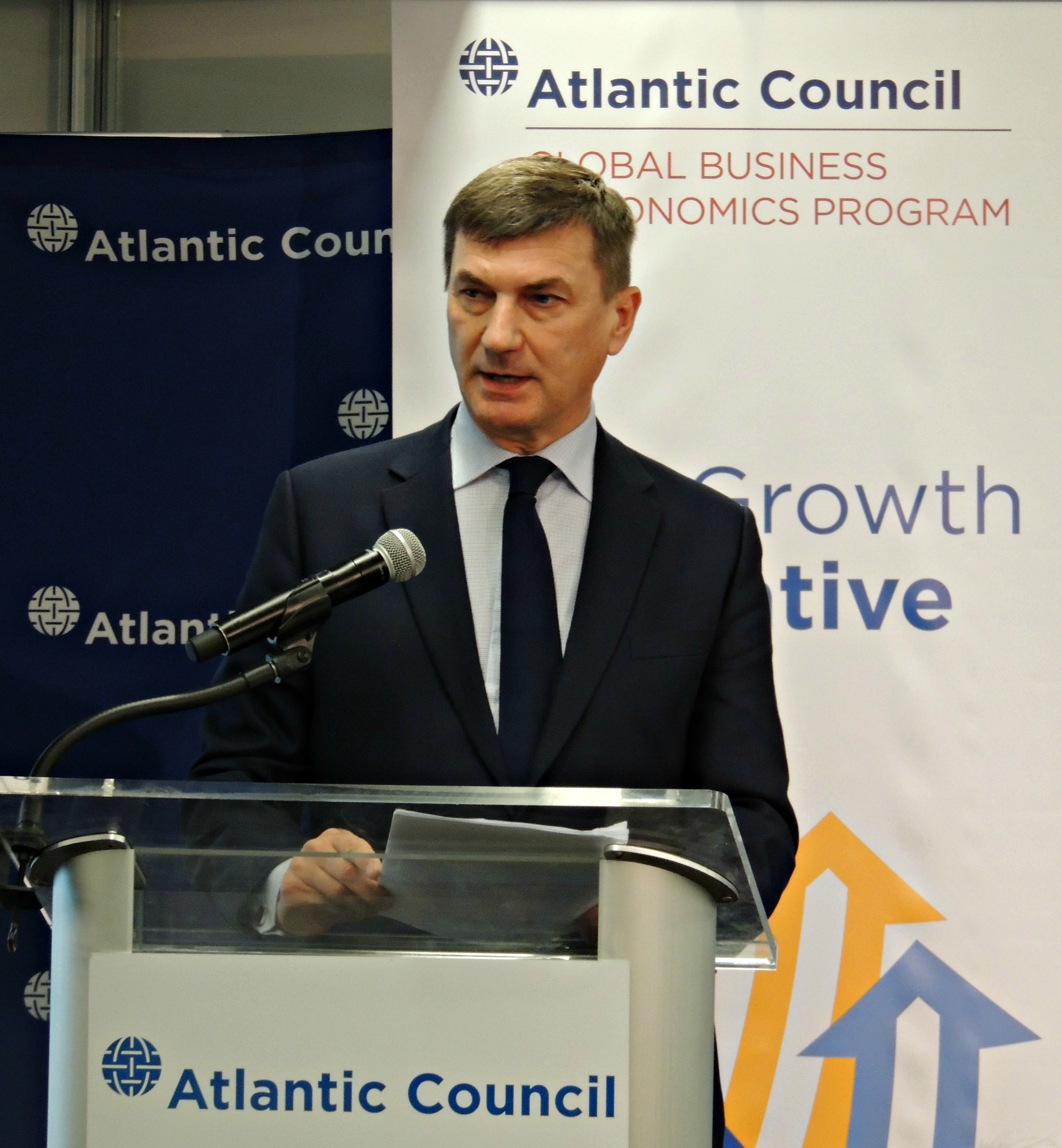
On March 10, The Atlantic Council’s EuroGrowth Initiative launched its flagship Report, Charting the Future Now: European Economic Growth and Its Importance to American Prosperity. Authored by the EuroGrowth Initiative Task Force, the report provides feasible yet ambitious solutions to generate greater economic growth in Europe and improve transatlantic relations. The report is fore worded by former European Commission President Jose Manuel Barroso and former U.S. Ambassador to the EU Stuart Eizenstat.
The half-day conference was opened by Stuart Eizenstat, who stated that “the greatest threat to the European Union is the absence of sustained economic and job growth”. Andrea Montanino, Director of the Atlantic Council’s Global Business & Economics Program then presented the report’s main findings and recommendations:
- In the short term: Negotiate Brexit wisely, preserve TTIP, restore Schengen and utilize available fiscal space for investment.
- In the medium term: Establish a real Digital Single Market, complete the Capital Markets Union and create a Services Union.
- In the long term: Reform the EU’s institutional design based on the concept of concentric circles and increase fiscal integration and the EU’s budget.

In the first panel discussion, Ms. Megan Greene (Chief Economist and Managing Director, Manulife Investments) moderated a discussion with Dr. Olivier Blanchard (C. Fred Bergsten Senior Fellow at the Peterson Institute for International Economics), Mr. Poul Thomsen (Director, European Department at the IMF), and Mr. Xavier Rolet (CEO of the London Stock Exchange Group) on the question of “More or Less Europe? Options for More Growth ahead of the Sixtieth Anniversary of the Treaty of Rome.” Panelists agreed on the need for the capital market, energy, and service union and lauded the report for its uncompromising and timely findings.
- Dr. Blanchard emphasized the need for political pragmatism in advocating greater European integration at a time of great stress to the union itself.
- Mr. Rolet spoke on the need to increase access to capital for European firms and entrepreneurs, highlighting the need to diversify finance sources and reduce reliance on bank loans, which amount for 80% of European corporate debt.
- Mr. Thomsen advocated for stronger adherence to already-existing EU regulations like the Stability and Growth Pact (SGP), which, paired with additional structural reforms can boost trust and enhance sustainable growth.

In the second panel discussion, Dr. Susan Lund (Partner at the McKinsey Global Institute) led a conversation with H.E. Gordon Bajnai (Group Chief Operating Officer at Meridiam and Former Prime Minister of Hungary), H.E. José Manuel Barroso (Former President of the European Commission and Former Prime Minister of Portugal), Dr. Paula Dobriansky (Former Under Secretary of State for Global Affairs), and Mr. Raymond W. McDaniel Jr. (CEO of Moody’s Investments) on the topic of “How US Economic Policies Can Affect EU Growth and Vice Versa”.
- José Manuel Barroso noted the need for reliable partners on both sides of the Atlantic and insisted on the mutual benefit of TTIP or a similar trade deal between them.
- Gordon Bajnai emphasized that the US-Europe relationship is based on fundamental shared values, whereas other economies may not hold similar liberal principles. He also noted that the U.S.’ foreign direct investment is magnitudes higher in Europe than in China.
- Mr. McDaniel spoke to the harm that political uncertainty can deal to growth, especially regarding capital formation in the long run.
Finally, Andrus Ansip, Vice-President of the European Commission and Commissioner for the Digital Single Market concluded the conference. His speech focused on the economic benefits that the EU provides to its member states, noting that since its accession, the Estonian economy has grown by 140% and tripled its exports. He insisted on the importance of strong transatlantic ties and praised the EuroGrowth Report for its contribution to a better understanding of the EU in the US.
